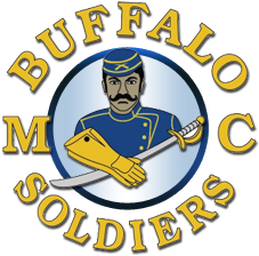Houston Chapter
of the
National Association of
Buffalo Soldiers
& Troopers
Motorcycle Club


|
|
|||
Houston Chapterof theNational Association of
|

|
||
|
|
|||

|
|||
... the Houston Chapter Beginning
|
 Ronald "Gold Rush" Goodwell |
In late 2001, Ronald "Gold Rush" Goodwell contacted Carl
"Road Dog" Laury, Florida Mother Chapter, about becoming a member of
the Buffalo Soldiers Motorcycle Club, which he and Leon "Grasshopper"
Sanford had researched online. Road Dog informed Gold Rush that he
was going to be visiting New Orleans, Louisiana and asked Gold
Rush if it was possible to meet him there. Gold Rush met with Road
Dog in New Orleans and was invited to come to the upcoming National
Association of Buffalo Soldiers & Troopers Motorcycle Club's
Winter Meeting in Orlando, Florida in February 2002. |
|
After meeting with Road Dog in New Orleans, Gold Rush returned to Houston and informed Grasshopper about his their meeting and about the invitation he receive to attend the Winter Meeting in Orlando. Gold Rush and Grasshopper flew to Orlando in February 2002 to attend the BSTMC Winter Meeting. While there, Gold Rush's petition to establish a chapter in Houston, Texas was accepted and approved. Also, Frank "Renegade" Styles of the Georgia Chapter cast a vote for Grasshopper to become a Member At Large because he came to Orlando with Gold Rush. ...Lest We Forget. |
Leon "Grasshopper" Sanford |
Texas Buffalo Soldier regiments were charged to protect frontier settlements, survey
and map the plains, strung thousands of miles of telegraph lines, build and repair dozens
of forts and escort countless wagon trains, stagecoaches, railroad trains, and cattle
herds across the southwest.
In 1874, with Buffalo Soldier regiments stationed at several
forts located throughout Texas from the Panhandle to the Valley, commander of
the 24th Infantry unit Major General William T. Sherman suggested to Congress to keep
Buffalo Soldier troops in Texas because "that race can better stand the extreme southern
climate than our white troops." Later that year, the 9th and 10th Cavalries mounted
up at Fort Griffin and rode into the now legendary Red River War with the southern
Plains Indians (Cheyenne, Arapaho, Comanche and Kiowa). In 1880, they chased Apache
Chief Victorio from Fort Davis across western Texas before forcing him into Mexico.
 2nd Lieutenant Henry O. Flipper, became West Point's first African
American graduate in 1877, in addition to the first commissioned black officer
of the regular U.S. Army. Flipper began his military service in 1878 as a
10th Cavalry Buffalo Soldier at Fort Sill, Indian Territory (now
Oklahoma). In 1880, after many frontier skirmishes with American Indians, Lt.
Flipper and his 10th Cavalry Buffalo Soldiers headed for service at
Fort Davis, Texas. That was where things truly fell apart.
2nd Lieutenant Henry O. Flipper, became West Point's first African
American graduate in 1877, in addition to the first commissioned black officer
of the regular U.S. Army. Flipper began his military service in 1878 as a
10th Cavalry Buffalo Soldier at Fort Sill, Indian Territory (now
Oklahoma). In 1880, after many frontier skirmishes with American Indians, Lt.
Flipper and his 10th Cavalry Buffalo Soldiers headed for service at
Fort Davis, Texas. That was where things truly fell apart.
At Fort Davis, Flipper was appointed quartermaster for the commissary and was
responsible for recording and safeguarding the store's weekly cash profits.
In 1881 Colonel William "Pecos Bill" Shafter took command of the fort with a
negative background following a string of harassment and misconduct charges
filed by his former company, the 24th Infantry Buffalo Soldiers.
The rumor around the military was that although Pecos Bill led African
American troops fairly well, he didn't actually like them much.
Shortly after his arrival as fort commander, Colonel Shafter relieved Flipper
of his duty as quartermaster and filed two criminal charges against him:
1) embezzlement of $3,791.71 of commissary funds, and 2) conduct unbecoming
of an officer and a gentleman. Flipper admitted that he personally had
discovered a $2,000 shortage but feared reporting it to his superiors, so he
decided to solve the problem himself by covering the debt with a royalty
check from his memoirs, but the funds had been delayed.
 Along with three of his officers and seven other white soldiers Shafter
participated on the review board in the 1881 court martial hearing against
Flipper. With the support of White civilians and fellow soldiers who
collected $1,700 to replace the missing money and testified to Flipper's
good character, Captain Merritt Barber, 16th Infantry,
defended Flipper. Henry O. Flipper was acquitted of embezzlement 3
months later but was found guilty of conduct unbecoming an officer.
On June 24, 1882, West Point's first African American graduate and the
Army's first black officer was dishonorably discharged from service.
Along with three of his officers and seven other white soldiers Shafter
participated on the review board in the 1881 court martial hearing against
Flipper. With the support of White civilians and fellow soldiers who
collected $1,700 to replace the missing money and testified to Flipper's
good character, Captain Merritt Barber, 16th Infantry,
defended Flipper. Henry O. Flipper was acquitted of embezzlement 3
months later but was found guilty of conduct unbecoming an officer.
On June 24, 1882, West Point's first African American graduate and the
Army's first black officer was dishonorably discharged from service.
After leaving the Army, Henry Flipper achieved esteem in the professional
fields of engineering, national government service, publishing, and
education. Unfortunately despite continuing his fight to clear his
military record and his name, Flipper died in 1940 without having
won either of them.





|
|
|
Houston Chapter of the National Association of Buffalo Soldiers & Troopers Motorcycle Club |
|
|